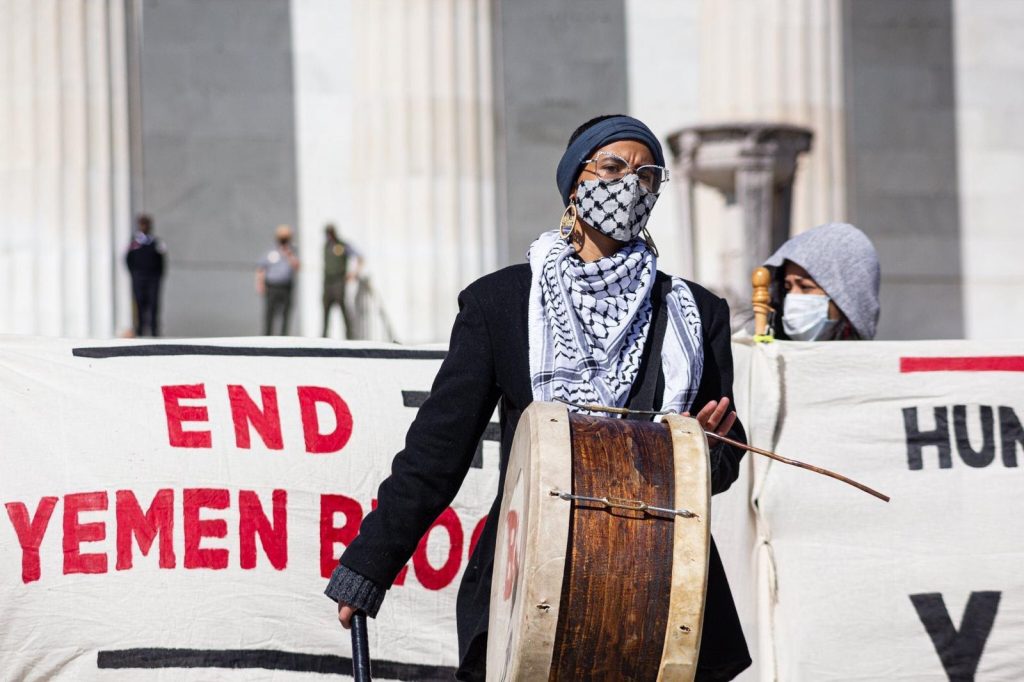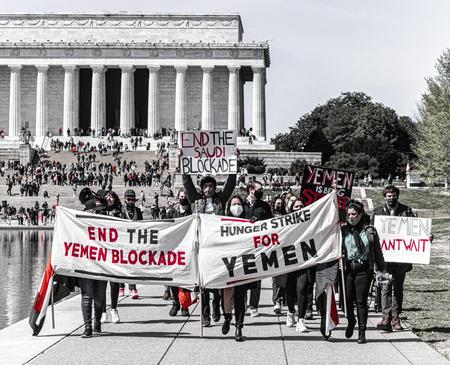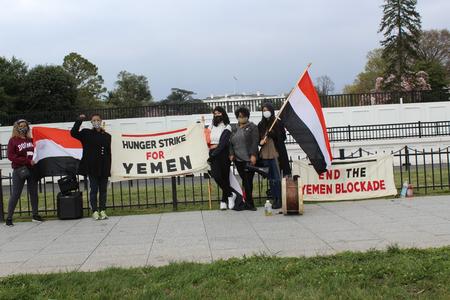Detroit Activists Lead Hunger Strike in Washington, Protesting Yemen Blockade
The Michigan-based Yemeni Liberation Movement traveled to the White House to object the U.S.’s backing of the Saudi Arabian siege.

A group of young activists from Detroit and Dearborn are leading a hunger strike in Washington, D.C., protesting the blockade of Yemen and urging a change in U.S. policy toward Saudi Arabia.

“We try to use our experiences as an extension of the voices of the people in Yemen who are not being heard,” says Iman Saleh, coordinator of the Detroit-based Yemeni Liberation Movement. “We have a very privileged version of starvation. We’re not worried about air raids. We know where we can get another meal if we wanted to. But we hope that we can at least show some glimpse of what people are going through.”
Since 2015, the Saudi government has imposed various blockades around Yemen, stemming the flow of food and medical supplies, leading tens of thousands of children to die of starvation in what UNICEF calls the “largest humanitarian crisis in the world.”
“How long do we have to be on our knees before the world starts to hear us?” Saleh asks.
.@IlhanMN is outside the White House meeting with @LiberateYemen, who has been on hunger strike for 9 days calling for an end to the U.S.-backed Saudi blockade of Yemen pic.twitter.com/M4z5yZCgap
— Jeremy Slevin (@jeremyslevin) April 6, 2021
The country of roughly 29 million has been in a near-constant state of political and military instability through the 21st century. After Houthi insurgents took over the country’s capital of Sana’a in 2014, a Saudi-led coalition imposed a military blockade around the country, which lies at the southern tip of the Arabian Peninsula. The naval maneuver was coupled with a bombing campaign that has terrorized civilians.
According to a report from the United Nations Office for the Coordination of Humanitarian Affairs (OCHA), “The war had already caused an estimated 233,000 deaths, including 131,000 from indirect causes such as lack of food, health services and infrastructure.”
2.3 million children are projected to experience acute malnutrition this year, with 400,000 Yemeni children under five threatened by death from starvation, according to UNICEF.
“They are being starved. And children especially, are more vulnerable than anyone, because they’re dealing with severe malnutrition, especially those that are under five. Every 75 seconds now in Yemen a child dies of malnutrition.” –Iman Saleh, Yemeni Liberation Movement
Michigan is home to roughly 30,000 Yemeni-Americans and many have family members still living in their home country. When former President Donald Trump limited immigration from Yemen in 2017 as part of the travel ban targeting Muslim-majority countries, many plans for family re-unification were thwarted.
Following the election of President Joe Biden, the White House shifted its stance toward the regional conflict.
“We’re also stepping up our diplomacy to end the war in Yemen — a war which has created a humanitarian and strategic catastrophe,” Biden announced in February. “And to underscore our commitment, we are ending all American support for offensive operations in the war in Yemen, including relevant arms sales.”

The Biden administration is continuing its pledge to defend Saudi’s “territorial integrity,” citing threats from Iranian-supplied forces. The UN says 22 million people, roughly three-quarters of Yemen’s population, still rely on humanitarian aid.
The crisis has elicited a response from Michigan’s congressional delegation. Congresswoman Debbie Dingell is leading an effort to call on the Biden-Harris administration to end the Yemeni blockade and is joined by representatives Rashida Tlaib, Andy Levin, Brenda Lawrence and Dan Kildee.
“We ask you to take additional steps to publicly pressure Saudi Arabia to lift this blockade immediately, unilaterally, and comprehensively,” Dingell’s letter reads. “This must include guaranteeing that humanitarian and commercial imports can freely enter Yemen; entrusting security oversight to the UN Verification and Inspection Mechanism for Yemen (UNVIM); fully permitting flights in and out of Sana’a airport; and ensuring that and crossings for commercial and civilian traffic are permanently opened.”
Regardless of the recent posturing of the federal government, members of the Yemeni Liberation Movement believe a hunger strike is necessary to bring attention to the issue and an end to the Saudi blockade.
“I don’t care what Gandhi said, hunger strikes are extremely violent,” said Saleh. “They are a violation of the body. It is used as a last resort to get the world to understand the demand in the cause we’re trying to push forth.”
Listen: Iman Saleh talks about the hunger strike and why it’s the most “radical action that we need to take in order to push for change.”
WDET’s Eli Newman spoke with Iman Saleh to talk about the hunger strike. Read excerpts, edited for clarity, below:
Newman: First and foremost, how are you feeling today?
Saleh: I was really hoping you weren’t going to ask me that question. I’m not really feeling good at all. When people think of starvation, you don’t really think of mental health, right? We just kind of think of body. And even though my body is weakening — it is, it’s also declining — it’s nothing compared to what I’m dealing with mentally.
Can you explain what led to this hunger strike? And why was that the way that you wanted to bring awareness to this issue?
I’m Yemeni and one of the organizers of the Yemeni Liberation Movement. We’ve been organizing, we’ve been calling representatives, sending letters, we’ve been protesting. But our voices just fell short. And so, when we started seeing the devastating effects of the fuel blockade that’s currently being implemented and supported by the United States, we decided that a hunger strike was not only our last resort, but also the most radical action that we need to take in order to push for change.
I’m hoping that you could elaborate on how the United States is involved in this blockade. We know that it’s being imposed by the government of Saudi Arabia, but how does U.S. politics factor into that?
The United States and Saudi government rely on each other in allyship, and the United States funds and provides weapons to the Saudi government. Logistical support, intelligence support, targeted bombings, targeted air raids. This is a land, sea and air blockade. The Navy is a part of this and blocking the border of the Hodeidah port in Yemen.
Can you go into maybe a little bit more detail about how the effect of this kind of blockade that we’re seeing. How does that affect the everyday Yemeni citizen?
What we’re talking about here specifically is a fuel blockade and that might not seem much right to anybody who’s thinking of famine. You don’t really think of a fuel, causing a famine, but it actually has severe repercussions. So, when you’re blocking fuel from entering the country, you’re essentially not allowing food and other imports from traveling into the country. And so I kind of like to call this war crimes gymnastics or like humanitarian war crime loopholes, where the United States and the Saudi government can say that, “Oh, we’re not blocking food and medicine, we’re just blocking fuel.” But then you just cripple an entire country, who can’t get access to those necessary goods. What we’re seeing now is 22 million Yemenis are … we don’t say experiencing starvation. We’re saying that they are being starved as a war tactic. It’s a label. They are being starved. And children especially, are more vulnerable than anyone, because they’re dealing with severe malnutrition, especially those that are under five. Every 75 seconds now in Yemen a child dies of malnutrition. Many hospitals are not even able to operate, and you’re kind of seeing a really sick plan, playing out in Yemen right now.
Can you explain how the effects of this blockade on Yemen has affected Yemeni Americans who are living around Metro Detroit?
It’s a few things actually. Not only do we have families that are impacted in Yemen due to this blockade. I have family in Yemen, on a lot of my family members still live there and are being affected by this blockade. But also the mass spread of misinformation by the Saudi government. Yemenis here in Detroit and also nationally, some of them sympathize with the Saudi government and actually encourage foreign intervention U.S. imperialism on Yemen. We believe in the YLM that only the people in Yemen have the right to self-determination. Our job here as Yemeni Americans is to hold accountable our representatives, our government that is killing and starving hundreds of thousands and starving millions of people in Yemen.
In terms of that response from elected officials, have you heard any word from Michigan’s congressional delegation or any response from the Biden administration?
We’ve actually reached out to Rep. Debbie Dingell, and she is supporting and pushing a congressional letter to urge her colleagues to pressure the Biden administration to end the blockade. Today, we are planning on meeting with Rep. Ilhan Omar as our hunger strike goes into day nine. We are picking up traction and attracting the attention of these politicians.
But in terms of anything from the executive branch, the Commander in Chief so to speak, has there been any sort of response from the White House?
Not from our hunger strike, no. But in terms of the blockade, we’ve seen that they are denying that it’s even happening. So how can we even fight to end this blockade if the government is not even acknowledging that it’s existing?
Finally, what would need to happen for you to end this hunger strike?
I want to throw that question right back at the Biden administration. We’re at his doorstep right now. This is a female-led hunger strike. So how long are you going to allow seeing American citizens using hunger strikes as a last resort to not even ask for anything irrational? We’re not asking for anything out of reach or unreasonable. We’re simply asking the United States to stop supporting the Saudi genocide, this blockade that’s killing thousands of people in Yemen. I really hope that the public can if not sympathize for Yemenis, because they might not be able to see or hear their voices, but at least see us as part of the community as citizens of this country, and sympathize with our call.
Trusted, accurate, up-to-date
WDET is here to keep you informed on essential information, news and resources related to COVID-19.
This is a stressful, insecure time for many. So it’s more important than ever for you, our listeners and readers, who are able to donate to keep supporting WDET’s mission. Please make a gift today.
